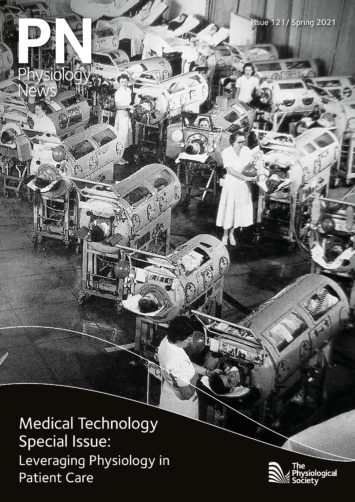
Physiology News Magazine
CEO’s View: An exciting year ahead of strengthening our community and networking opportunities
News and Views
CEO’s View: An exciting year ahead of strengthening our community and networking opportunities
News and Views
Dariel Burdass, CEO, The Physiological Society
https://doi.org/10.36866/pn.121.7
One of the most important elements of a learned society is its membership, and members are at the heart of The Society’s strategy. For 2021 we have launched a contemporary and inclusive new suite of membership categories. This will better support our members, both those in academic and non-academic physiology-focused careers. These changes will enable us to further tailor member benefits for each career stage and to increase the breadth of our membership.
To enable members to continue to network and share scientific knowledge, and to strengthen our membership benefits, we will be continuing to offer a wide range of webinars in 2021. In 2020, we ran three successful professional development (PD) webinar programmes. The longest-running series took place during the first lockdown and was designed specifically for members. The webinars were well attended, particularly by our early career physiologists, and received positive feedback including some suggestions for future sessions.
We intend to build on this success with three further programmes running in 2021; the first will run in March and will support undergraduates. There will be two subsequent series: one for postgraduates and one for academics looking to progress their career through teaching and learning in higher education.
Building on the success of our Scientific Theme webinars, it is our intention to run two of these webinars per month in 2021 and the call remains open for members to submit their proposals. We have three in the pipeline so far. Our PD webinars and Scientific Theme webinars are free for members to attend with access to the recording after the event. Non-members will need to pay £20 to watch live with a 7-day catch up.
During 2021 we will also be launching a new grants programme, for funding opportunities in 2022 and onwards, which is designed to achieve a coherent programme of end-to-end support for our members. The goal of the programme is to both encourage and reward long-term membership, but also to develop a cadre of advocates for physiology and The Society. Further details to follow.
Under construction on our website is a new member area with resources and activities that are exclusive to members. This member area, along with our growing programme of member-only content, is part of our ongoing investment in the future of physiology.
To enable us to successfully deliver our programme of activities we rely on our loyal and engaged membership, which we are looking to broaden and grow. If you know of someone who is a lapsed member or is a potential member let them know about our new membership categories, which can be found on our website.
In addition, we will shortly be opening our nominations for the next round of Board appointments; we will be looking to appoint three General Trustees to take up office at the 2021 November Member Forum. Being a Trustee is a critical role within The Society and if you would like to influence our future direction, I would encourage you to apply. Further details will be posted on the website and members will be notified through our newsletter.
Our membership is a unique source of expertise and knowledge and we are fortunate to be able to harness this to inform our policy work. The Society has already begun to have more influence shaping UK policy in areas of physiological concern such as ageing, obesity and exercise.
The risks of serious illness from COVID-19 requiring hospitalisation and dying both rise with age; consequently, in November 2020 we launched our report, A National COVID-19 Resilience Programme: Improving the health and wellbeing of older people during the pandemic. This project brought together physiologists, nutritionists, geriatricians, physiotherapists, and clinicians to discuss the physiological factors behind why the risk of COVID-19 disease severity rises with age. The project was a collaboration between The Society and Centre for Ageing Better, part of the UK Government’s What Works Network and the report was launched at the Discussion Meeting of the UK Parliamentary & Scientific Committee.
We highlighted the physiological evidence demonstrating that physical activity (with tailored exercise or physical activity goals) represents one of most impactful ways in which older people can reduce the risk of developing severe COVID-19, improve recovery, and limit deconditioning and frailty from home confinement. We recommended that the Government introduce a National COVID-19 Resilience Programme to bring together a package of measures to support older people through the lockdown and beyond, keeping them healthy and resilient over the winter.
The report was covered in national media and we have subsequently engaged with a variety of key stakeholders, such as the NHS, Public Health England, local authorities, and the Chief Medical Officers.
In January of this year, the House of Lords Science and Technology Select Committee released its inquiry into Ageing entitled Ageing: Science, Technology and Healthy Living. I am delighted to report that there is significant inclusion of material from our Growing Older Report in this inquiry with The Society being recognised and Society members contributing.
Also, in January, we launched our latest report, Translating UK knowledge and research into impact: Physiology and Knowledge Exchange. The report can be downloaded from our website: physoc.org/ knowledge-exchange
The launch event participants heard from the Executive Director of BBSRC, Melanie Welham, and we also showcased how physiology knowledge and research is translated into impact.
Based on the report’s findings, a series of recommendations have been made for the UK Government, institutions and The Society, aimed at maximising the contribution of physiology and addressing knowledge exchange barriers.
Please do contact me to let me know what we do well, where we could do better, what we might stop doing and what we could do more of.
